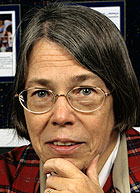Washington University is in the spotlight for its pivotal role in the Genomics Education Partnership (GEP), a collaborative effort to provide research experience in genomics to undergraduate classrooms across the country.
Genomics, the study of an organism’s entire genome (collection of DNA), is an exciting area in which students get involved in research.

The GEP consists of more than 40 faculty members from a variety of colleges and universities, including historically black and Hispanic-serving institutions and schools with a high proportion of first-generation college students.
By making it easy for undergraduate institutions to incorporate research into their regular, academic-year curricula, the GEP can reach underserved students who otherwise have limited opportunities to learn to think like scientists.
At the helm of this mission is Sarah C.R. Elgin, Ph.D., the Viktor Hamburger Distinguished Professor in Arts & Sciences and professor of biology and of education in Arts & Sciences as well as professor of biochemistry and molecular biophysics and of genetics in the School of Medicine.
In 2002, Elgin was one of 20 professors awarded $1 million from the Howard Hughes Medical Institute (HHMI) to bring research into the undergraduate classroom. Over the next four years, Elgin and her colleagues developed and implemented a research-based genomics course for juniors and seniors at WUSTL to polish and interpret their own portion of raw DNA sequence.
The course, “Research Explorations in Genomics,” is a collaborative effort. Elgin co-teaches with Elaine Mardis, Ph.D., associate professor of genetics and co-director of the Genome Sequencing Center, and Jeremy Buhler, Ph.D, associate professor of computer science and engineering. Several other members of the WUSTL community provide guest lectures to illustrate how they have used genomic approaches to answer diverse questions in their own research.
Elgin’s course was so successful that she became one of eight professors to have their original HHMI grant funding renewed in 2006. With that support, she set out to make the course available to undergraduates at institutions across the country.
Biology majors at WUSTL often begin their research by spending a summer in the laboratory under the guidance of a faculty, graduate student or postdoctoral research mentor.
However, the privilege of a summer research experience is unusual at many institutions due to inadequate facilities, limited funding, high student-to-faculty ratios and a lack of experienced or research-active mentors.
Elgin’s course overcomes these barriers by providing students with computer-based research opportunities.
This strategy minimizes the cost of research materials because the necessary data is freely available on the Web, and most institutions already possess adequate computer facilities.
Mentoring also is economized by teaching students the same electronic tools and strategies in a group setting and by relying on former students to serve as undergraduate teaching assistants (TAs).
Thus, one dedicated faculty member can provide research opportunities for a much larger number of students than would be possible in traditional, one-on-one mentoring relationships. GEP faculty and TAs learn the relevant software during summer workshops at WUSTL.
“Our GEP faculty is an impressive group,” Elgin said. “Each member has taken the basic format and adapted it to the requirements of their institution and the needs of their students. Their energy and enthusiasm are terrific.”
The GEP’s approach makes offering a research-based course a viable option for a wide variety of institutions. Students in the program are currently working on a comparative genomics problem that focuses on genes in a heterochromatic, or tightly packed, region of the DNA.
In the future, students might participate in research ranging from regulation of gene expression to the evolution of a species.
To sum up the philosophy of the GEP, Elgin references an ancient Chinese proverb that states, “I hear and I forget; I see and I remember; I do and I understand.” In other words, Elgin maintains that students can’t truly understand the scientific process until they have conducted their own research.
This assertion is supported by an article recently published in the Oct. 31 issue of Science in which Elgin and her colleagues present results from an exit survey of students who participated in the GEP, a course without research or a summer research experience.
The evidence suggests that the GEP provides students with a more comprehensive learning experience than traditional, lecture-based courses.
The results also reveal that the GEP course is comparable to a summer research experience in terms of its capacity to help students prepare for a career in science.
According to Elgin, the success of the GEP can be partially attributed to students’ sense of ownership over their research.
“It makes a huge difference to students when you tell them, ‘You’re responsible for this,'” Elgin said.
“‘This is going to go in the databases. This is going to be used by different scientists. Do it right,'” she said.